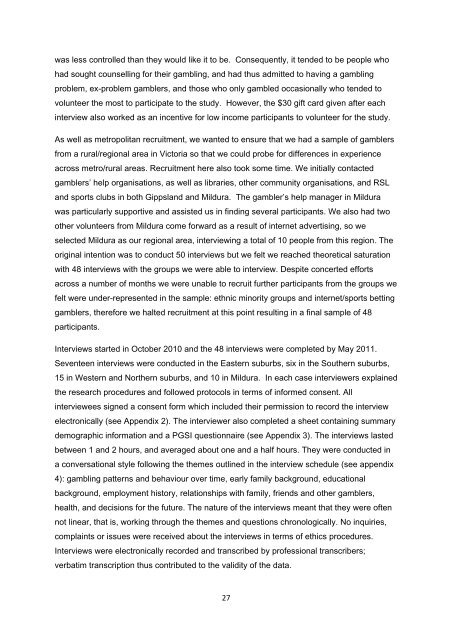Gamblers tell their stories: Life patterns of gambling
Gamblers tell their stories: Life patterns of gambling
Gamblers tell their stories: Life patterns of gambling
You also want an ePaper? Increase the reach of your titles
YUMPU automatically turns print PDFs into web optimized ePapers that Google loves.
was less controlled than they would like it to be. Consequently, it tended to be people who<br />
had sought counselling for <strong>their</strong> <strong>gambling</strong>, and had thus admitted to having a <strong>gambling</strong><br />
problem, ex-problem gamblers, and those who only gambled occasionally who tended to<br />
volunteer the most to participate to the study. However, the $30 gift card given after each<br />
interview also worked as an incentive for low income participants to volunteer for the study.<br />
As well as metropolitan recruitment, we wanted to ensure that we had a sample <strong>of</strong> gamblers<br />
from a rural/regional area in Victoria so that we could probe for differences in experience<br />
across metro/rural areas. Recruitment here also took some time. We initially contacted<br />
gamblers’ help organisations, as well as libraries, other community organisations, and RSL<br />
and sports clubs in both Gippsland and Mildura. The gambler’s help manager in Mildura<br />
was particularly supportive and assisted us in finding several participants. We also had two<br />
other volunteers from Mildura come forward as a result <strong>of</strong> internet advertising, so we<br />
selected Mildura as our regional area, interviewing a total <strong>of</strong> 10 people from this region. The<br />
original intention was to conduct 50 interviews but we felt we reached theoretical saturation<br />
with 48 interviews with the groups we were able to interview. Despite concerted efforts<br />
across a number <strong>of</strong> months we were unable to recruit further participants from the groups we<br />
felt were under-represented in the sample: ethnic minority groups and internet/sports betting<br />
gamblers, therefore we halted recruitment at this point resulting in a final sample <strong>of</strong> 48<br />
participants.<br />
Interviews started in October 2010 and the 48 interviews were completed by May 2011.<br />
Seventeen interviews were conducted in the Eastern suburbs, six in the Southern suburbs,<br />
15 in Western and Northern suburbs, and 10 in Mildura. In each case interviewers explained<br />
the research procedures and followed protocols in terms <strong>of</strong> informed consent. All<br />
interviewees signed a consent form which included <strong>their</strong> permission to record the interview<br />
electronically (see Appendix 2). The interviewer also completed a sheet containing summary<br />
demographic information and a PGSI questionnaire (see Appendix 3). The interviews lasted<br />
between 1 and 2 hours, and averaged about one and a half hours. They were conducted in<br />
a conversational style following the themes outlined in the interview schedule (see appendix<br />
4): <strong>gambling</strong> <strong>patterns</strong> and behaviour over time, early family background, educational<br />
background, employment history, relationships with family, friends and other gamblers,<br />
health, and decisions for the future. The nature <strong>of</strong> the interviews meant that they were <strong>of</strong>ten<br />
not linear, that is, working through the themes and questions chronologically. No inquiries,<br />
complaints or issues were received about the interviews in terms <strong>of</strong> ethics procedures.<br />
Interviews were electronically recorded and transcribed by pr<strong>of</strong>essional transcribers;<br />
verbatim transcription thus contributed to the validity <strong>of</strong> the data.<br />
27


